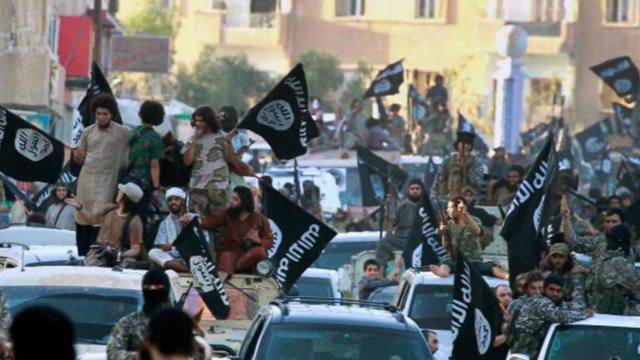Strategic Defense in the Middle East
"If ISIS, for example, threatens to base itself in the Syrian Golan, it might be that a Hezbollah presence is actually preferable."
Lt.-Col. Ron Tira, fighter pilot, strategist, Israel Air Force
"The emergence of an uncertain and unstable strategic environment is conducive to strategic surprises."
"Israeli intelligence is challenged by a plethora of new actors and leaders whose modus operandi is far from clear."
Efraim Inbar, director, Begin-Sadat Center for Strategic Studies, Bar-Ilan University
 |
| Inside the Delta Force Mission to Kill top ISIS leader -- ABC news |
Israel proved itself time and again equal to the occasion. Surprising both the assemblage of Arab military coalitions confident of easy conquest, and the international community, watching with interest as one drama after another unfolded, with Israel Defence Forces proving equal to the task of defending the country and dispersing its manifold enemies. Defending itself against near neighbours proved somewhat more taxing. Including the offensives of suicide bombers in near proximity.
When a solution presented itself through a security barrier, the world screamed foul, accusing Israel of criminal behaviour in defending its citizens against the constant surprises of martyrdom-fuelled mass murders. But it did prove a fairly useful solution, and the suicide attacks came to a halt, leaving the country's European critics grumbling about the unfairness to Palestinian aspirations. New challenges now present themselves above and beyond the rockets that Hamas is lobbing from Gaza.
The Arab Spring, that Israel and the rest of the world sat back and watched with the suspense of curiosity has left anarchy in its wake, aided and abetted by Western interference in the prerogatives of Middle Eastern despots to tyrannize their tribal, ethnic, sectarian populations into the submission of reasonable behaviour. But with Moammar Ghadafi's stern hand of retribution absent, after taking out the dictator of Baghdad, nothing has gone according to Western schedule.
Libya and Iraq struggle to surmount the malignant influence of Islamist lunacy for whom slaughter has become an aphrodisiac. Syrian civil war with its president continuing to teach his insubordinate Sunni population a lesson they could never recover from, since no one has yet revisited life who has been consigned to death, has created waves of desperate migrants flooding into Europe, along with other Muslims suffering the ill-fated experience of Islamist carnage.
And for Israel, there is the ongoing problem of its neighbours. If it isn't Hamas, then it's Hezbollah; if the Gulf States have relented in their collective fear of Iran, and now view Israel as perhaps the solution to their concerns, Israel's existence has become critical to the furtherance of their own, in no small part. Israel's collaboration with Egypt, and vice versa, Saudi Arabia's conversion to reasonableness about a Jewish presence, all signal a sea change in the Middle East.
Whether any of that might last beyond a solution over Iran's hegemonic Shiite conquest is moot. But for the presence, Israel, along with the Sunni Middle East, is suffering quite the headache. Near Israel's northern border with Lebanon the village of Muhaybib, a farming village of some 90 houses hemmed in by fields, Israeli intelligence has now determined the village to have been transformed to a fortress.
The village now has five rocket-launching sites, nine arms depots, three anti-tank positions, a command post and what appears to be signs of the existence of three tunnels. Hezbollah appears to have moved military equipment into Shiite villages near Israel's perimeter; strategizing civilians as a human shield, for to attack a missile base would be to sacrifice innocent villagers. What is good enough for Hamas, is certainly good enough for Hezbollah; they all sing from the same chorus.
And then there is the danger of igniting, perhaps inadvertently, an overall war in the Middle East, bringing hideous devastation to the region, already beset with human rights violations of the most unfathomable varieties. The focal point of the concern is Iran, always the growing power that Iran has manipulated itself into. Those Arab regimes not consumed like Libya, Syria and Iraq with ISIS, have Iran to contend with.
Sunni Arab states are no longer fixated on the Palestinian problem vis-a-vis Israel's existence. Peace is a requisite not with the Palestinians in an accord with Israel, but in the removal of the threat that Iran represents. "Iran has divine permission to destroy Israel", stated Mojtaba Zolnour, a figure of note in the Revolutionary Guards. The situation in the Middle East is so fluid, so complex, so confusing that intelligence is elusive.
So elusive that the Middle East itself finds it difficult to parse the intentions and outcomes of what it sees playing out before its incredulous eyes as Islamism runs berserk over everything that is discernible as 'normal', 'usual', 'expected' or 'acceptable'. But it is traditional, it does reflect Islam's origins and its original purpose in proselytizing to expand the Prophet Mohammad's brave new Bedouin religion worldwide.
Labels: Arab League, Arab Spring, Conflict, Hezbollah, Iran, Islamic State, Israel, Middle East
0 Comments:
Post a Comment
<< Home